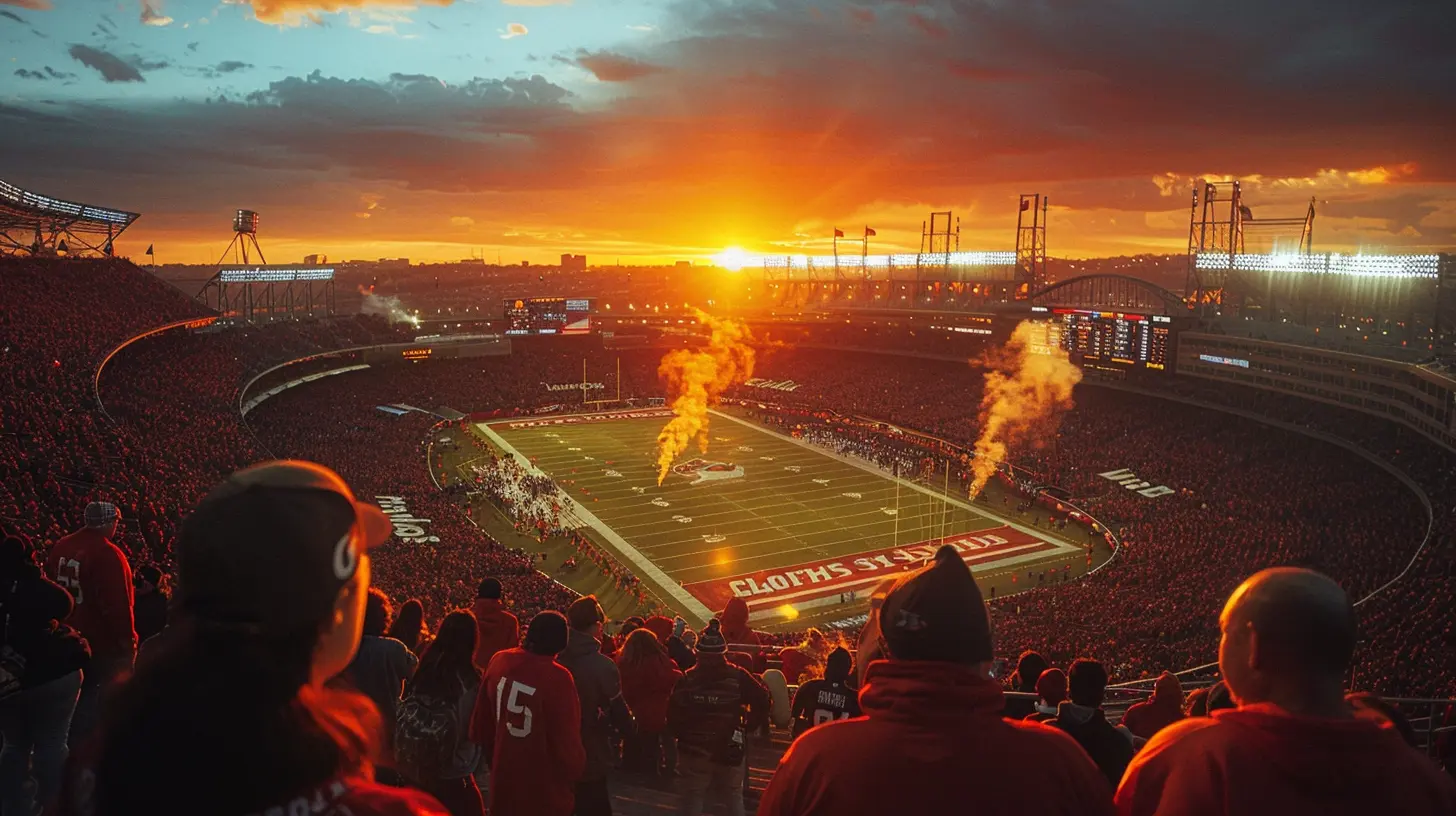Home Field Advantage: How Fans Make It Happen
6 July 2025
When you think about the roar of the crowd, the sea of team colors, or the deafening chants echoing through a stadium, it's clear that fans play a crucial role in shaping the atmosphere. But their influence doesn’t stop at the emotional level—fans can actually impact the outcome of a game. Yep, we're talking about home field advantage, and it’s a lot more than just a buzzword. It’s a real, tangible thing that can give teams the upper hand.
But how exactly do fans make it happen? How does the collective energy of thousands of people translate into a team’s success? In this article, we're going to dive into the magic of home field advantage and explore how fans are the secret ingredient behind it.

The Basics of Home Field Advantage
Let's start with the basics. Home field advantage refers to the edge that teams tend to have when they play in their own stadium, in front of their own fans. It's not a myth; it's backed by stats. Teams playing at home win more often than they do when they’re on the road. The home team is more likely to dominate, and this isn’t just a fluke—it’s a trend that spans across different sports, leagues, and countries.Now, let’s break this down. When a team is playing at home, they’re in familiar surroundings. They know the quirks of the field or court, the weather patterns, and even little things like the locker room layout. But there’s something even more significant—something that can’t be measured in stats or diagrams: the fans.

Fans: The Unsung Heroes
Fans are the lifeblood of home field advantage. They’re like the wind beneath a team’s wings, giving the players that extra boost of energy and focus. Think about it—when you’re in a stadium filled with thousands of people chanting your name, wearing your team's colors, and cheering your every move, it has to feel good, right? That kind of support can make the difference between a player freezing under pressure or rising to the occasion.The Emotional Surge
Humans are emotional creatures, and athletes are no exception. When a stadium is packed with screaming fans, the home team feeds off that energy. It's like plugging yourself into a power source. The noise, the excitement, the collective hope—it all translates into an emotional surge for the players. They feel more motivated, more confident, and more determined to win.Have you ever been to a live game? You can literally feel the energy in the air. It’s electric. And that electricity has a way of transferring onto the field. It’s not just hype either. Studies have shown that athletes perform better under positive reinforcement. And who’s better at providing that than the home crowd?
The Psychological Impact
It’s not just about the emotional boost; home field advantage plays with the mind too. Imagine you’re an away team player walking into a stadium where 50,000 people are booing you before you even touch the ball. That’s gotta mess with your head, right?For the away team, the hostile environment can be mentally exhausting. The constant noise, the chants, the occasional jeer—it all adds pressure. The away players know they’re not welcome, and that can lead to mistakes. They might rush plays, second-guess themselves, or struggle to communicate over the noise. It’s like trying to have a conversation in the middle of a rock concert.
On the flip side, the home team feels like they’re playing in a safe space. They know the crowd has their back, and that makes them more relaxed and composed. And when you're relaxed, you're more likely to make smart, strategic decisions. Home field advantage is as much a psychological game as it is a physical one.
The Referee Factor
Let’s talk about something a little controversial: referees. Believe it or not, fans can even influence the officials. Studies have shown that referees are more likely to make calls in favor of the home team. It’s not that refs are biased (at least, not intentionally), but they’re human, and humans are susceptible to pressure.Imagine you’re a referee, and you make a call against the home team. Suddenly, 70,000 fans are screaming at you, booing, and questioning your eyesight. Even if you’re trying to be impartial, that kind of pressure can get to you. You might hesitate the next time you make a close call, or you might subconsciously lean in favor of the home team to avoid the wrath of the crowd. It’s not fair, but it happens.
The Noise Factor
Let’s not forget about the noise. Noise is a huge part of home field advantage. The louder the fans, the harder it is for the away team to communicate. This is especially true in sports like football, where communication is key. Quarterbacks rely on being able to shout instructions to their teammates. But when the crowd is roaring, those instructions can get lost in the noise. It’s like trying to give directions at a theme park while standing next to a roller coaster.In fact, some stadiums are specifically designed to amplify noise. CenturyLink Field, home of the Seattle Seahawks, is famous for being one of the loudest stadiums in the NFL. The crowd noise there has been known to cause false starts and miscommunications for opposing teams. It’s like trying to play a game of chess while someone’s blaring heavy metal music in your ear. Good luck with that!
Rituals, Traditions, and Superstitions
Fans don’t just show up to games—they bring rituals, traditions, and superstitions with them. Whether it’s the "wave," synchronized chants, or even wearing lucky socks, these rituals create a sense of unity and purpose. For the players, it can feel like they're part of something bigger than themselves. They’re not just playing for a win—they’re playing for the pride of their fans, their city, and their community.These traditions also serve to intimidate the opposing team. Think about college football, where fans will chant fight songs in unison or perform coordinated dances. It’s a show of strength, and it’s a reminder to the away team that they’re in enemy territory. It’s like walking into a lion’s den and hearing the roar before you even see the lions.

The X-Factor: Fans as the 12th Player
In many sports, fans are often referred to as the "12th player" (or the "6th man" in basketball). This metaphorical player represents the extra push that fans give to their team. The idea is simple: fans, by creating an intense atmosphere, can have a direct impact on the game. They can distract the opposing team, energize their own players, and even influence decisions on the field or court.It's not uncommon for fans to strategize their support. In soccer, for example, fans will be silent when their team is defending, but the moment there's an attacking opportunity, they roar to life, urging the team forward. It’s like a signal to the players that it’s go time. When the fans are in sync with the game, they can feel like an extension of the team itself.

Does Home Field Advantage Always Work?
Now, before we get too carried away, it’s important to note that home field advantage isn’t a guaranteed win. There are plenty of examples of teams losing at home despite the support of their fans. Some factors—like poor performance or a stronger opponent—can override the advantage of playing at home. Plus, some athletes thrive on being the underdog and love shutting down hostile crowds.That said, home field advantage is still a real phenomenon. It's just that in some cases, it’s not enough to overcome other variables. But when it all comes together—the energy, the noise, the rituals—it can be a game-changer.
The Future of Fan Impact
With technology evolving, the role of fans in sports is changing. Virtual reality, augmented reality, and even fan engagement apps are making it possible for fans to influence games without physically being in the stadium. Some teams are experimenting with ways to bring the noise and energy of home field advantage to away games by connecting fans through digital platforms.But one thing is clear: whether they're in the stands or at home, fans will always be a vital part of the game. They’re not just spectators—they’re participants. They celebrate the wins, grieve the losses, and, most importantly, they make home field advantage happen.
Conclusion
Home field advantage is more than just a convenient phrase. It’s a powerful force that can shape the outcome of a game, and at the heart of it are the fans. Whether through emotional support, noise, rituals, or even subtle psychological pressure, fans create an environment that can lift their team and rattle the opposition. So, the next time you're at a game and you feel the energy of the crowd, remember—you’re not just watching the game. You’re part of it.all images in this post were generated using AI tools
Category:
Fan CultureAuthor:

Nelson Bryant
Discussion
rate this article
1 comments
Lulu McQuillan
This article compellingly highlights the psychological and tactical elements of home field advantage, emphasizing how passionate fans amplify players’ performances. The interplay of crowd energy and familiarity truly creates an environment that can sway game outcomes significantly.
July 23, 2025 at 3:54 AM

Nelson Bryant
Thank you for your insightful comment! I'm glad you found the article highlights on the impact of passionate fans and the unique advantages of playing at home compelling.


